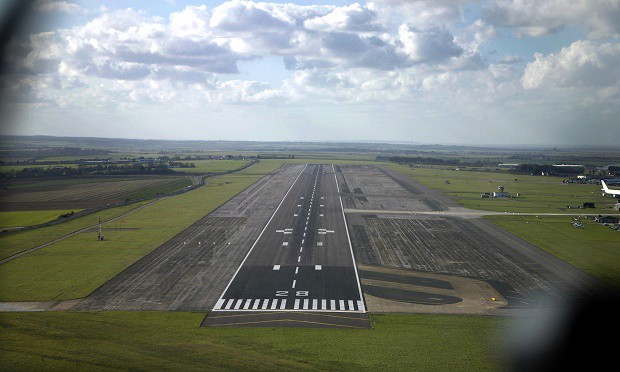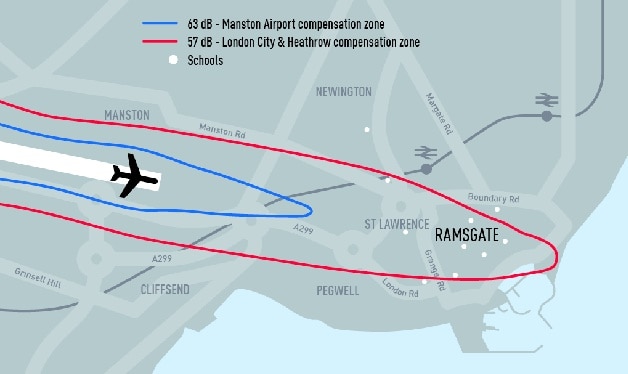
The Planning Inspectorate examination of the bid being made by firm RiverOak Strategic Partners (RSP) to acquire the Manston airport site and create a cargo hub and associated aviation business is due to come to a close on July 9.
The process, which opened in January, has examined a number of contentious issues surrounding the application, including night flights, noise and noise compensation, land values, funding and funders and the question of whether the project is needed.
Six months of wrangling has seen submissions from RSP presented to back its case that a development consent order should be granted to allow the compulsory purchase of the site.
The bulk of the land in question is owned by Stone Hill Park which has also presented its case as to why the DCO should be refused.
Representations have also been made by a wide variety of organisations, including Thanet council and Historic England, campaign groups including Save Manston Airport association, Supporters of Manston Airport, No Night Flights and Nethercourt Action Group, numerous individuals and both Manston museums.

The Spitfire and Hurricane Memorial Museum has raised concerns at the paucity of discussion about the two venues and the future of their freehold.
In a submission from museum manager Matt Demedts it says there has been no confirmation or indication of RSP’s plans with regards to the museum’s current and future status as a freehold and wider plans for the museums area in general.
Mr Demedts said oral offers of the freehold being “re-granted” had been made but a request was made that the examining panel the examining authority would ask for clarity on what exactly was intended for the museums.
In the fourth round of Examining Authority questions, published on the Planning Inspectorate site, the issue of whether compulsory acquisition of the museum sites is justified as neither venue is required to move has been raised.
In response RSP say: “While the Applicant currently believes that outright compulsory acquisition is necessary for all the land subject to that power in its application, it may find later once detailed design has been completed that the lesser imposition of a restrictive covenant may be possible.”
Concerns have also raised over the amount of noise compensation that would be payable and the number of homes that would be eligible for that.
Campaign group Manston Airport Fair Noise Insulation Compensation says Thanet residents are not being offered the same level of compensation that those living near other airports will receive.
A MAFNIC spokesperson said: “Riveroak are offering noise compensation at 63dB (decibels). London City Airport and Heathrow are offering residents compensation at 57dB. Thanet needs the same protection, “
The current compensation on offer would mean around 275 residents qualifying for up to £10,000 to soundproof their homes.
If the 57dB threshold were to be applied MAFNIC calculates that up to 6,500 properties in Thanet would be entitled to protection.

The group says the figures are based on an independently commissioned Civil Aviation Authority noise contour map which was presented to airport planning inspectors at the recent DCO meetings.
MAFNIC has organised an online petition calling for parity with other UK airports and a map showing where compensation could apply here
The Examining authority has also raised the issue of the compulsory purchase proposals overlap on land owned by Manston Green developers Cogent LLP.
RSP says it will work with the developers to confirm the use of the overlapping land but that the DCO scheme will not impact upon the deliverability of the Manston Green development.
The Examining authority asks why there has been little/no attempt to engage with Cogent.
Funding and funders
Questions raised over the funders for the scheme include whether identities should be in the public domain.
RSP said in submitted documents: “Business Investment Relief is an HMRC-approved scheme introduced to encourage non-domiciled UK residents to invest in the UK and does not require those using it to be disclosed. For the ExA to insist on full disclosure of those individual investors has the potential to undermine this type of investment in the UK.”
RSP say a total of £13.1million had been set aside for costs, including noise mitigation, and submitted a letter from Aldgate Developments pledging £250million to the first phase of works on the project. It is stated that Rubicon Capital Advisors will raise funds for the scheme.
The Examining authority has asked if agreements have been reached with Adgate and Rubicon whether Aldgate Developments is one of the four additional funders indicated by RSP in written submissions.
Further issues
Further questions have been raised about business plan forecasts, road networks and the proposed use of the Northern Grass.
The question of land contamination has also been raised with the likely presence of firefighting foam residual chemical PFOA (perfluorooctanoic acid ) in the land and water.
PFOA can escape sites by air, by ground water, by outfall to sea or by water supply. Manston has all of these escape routes.
Southern Water abstracts from the Manston aquifer but the site has never been tested for PFOA. The assertion is that PFOA classification would render construction plans ‘obsolete’ for both RSP and SHP as well as raise significant questions about the health of Thanet residents in relation to water safety.
Thanet council has said it is reviewing its contaminated land strategy but appears not to be taking account of the PFOA classification.
Industry fire-safety experts from the oil and gas and aviation sectors and firefighter trade unions are urging governments to enact a global ban on PFOA,
The issue was addressed at the 9th Conference of the Parties to the Stockholm Convention on Persistent Organic Pollutants.
The convention’s scientific experts recommended the ban, including in firefighting foam, due to its toxicity, persistence, bioaccumulation in the food chain, and ability to travel long distances.
PFOAs have been detected at trace levels in human blood, and high concentrations have been linked to organ damage in rats and mice.
Avia Solutions
A new submission from resident Christine Redmond asks whether the Avia Solutions report, commissioned by Thanet council and published in 2016, can still be considered as evidence.
Mrs Redmond says the firm, which came to the conclusion that it was “most unlikely that Manston Airport would represent a viable investment opportunity, has now U turned on its view of the cargo market.
She submits: “The Avia consultancy report previously trashed RSP’s plans for a successful cargo hub at Manston Airport, citing a limited capacity for further cargo business overall in the UK, and Thanet District Council (TDC) and Stone Hill Park made much of this consultancy report during the PINS meetings.
“However, (in a recently published report) Avia Solutions now clearly supports the objective of a prosperous future for air cargo. This is a contradiction to Avia’s previous report produced for TDC. Surely this latest news from Avia Solutions which plainly shows their confidence in air cargo growth, invalidates the credibility of the original consultancy report to TDC?”
Examination closing
Answers to the new set of Examining Authority questions are due to be submitted by tomorrow (June 28). There are then two further deadlines for the submission of comments on July 2 and July 5.
The examination report and recommendation is expected to be submitted to the Secretary of State by November with a decision likely to be announced in January 2020.

